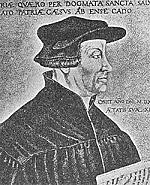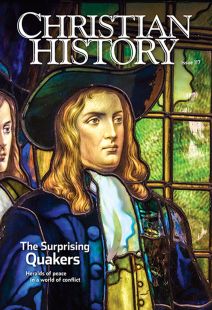A radical experiment
SOMETHING HAS GONE WRONG in the modern world. Men and women … are a confused and bewildered generation. This is not true merely of the vanquished, but of a majority of the victors … not merely of those who live in the cellars of bombed houses and ride in converted cattle cars; it is true likewise of those who live in steam-heated apartments and ride in Pullman drawing rooms. …
Order Christian History #117: The Surprising Quakers in print.
Subscribe now to get future print issues in your mailbox (donation requested but not required).
What if the Quaker Movement, for all its modesty and smallness, could give some lead to modern seekers looking for light on what a redemptive fellowship should be or could be? All the effort that has gone into Quakerism would thus become worthwhile. Quakerism would not be an end in itself, but would be one means to a large and glorious end …
Whatever a redemptive movement may be called, wherever it may be produced, and whatever its external form, it cannot be truly effective unless it includes Veracity, Immediacy, Urgency, Fellowship, and Concern.
Cutting red tape?
The actual Quaker Movement has often been a poor thing. It has advanced and receded many times in 300 years of tumultuous history. Seldom have all five of the vital elements been equally incorporated in the movement. Frequently Friends, who began by cutting the ecclesiastical red tape, have been unhappily successful in producing their own variety.
Friends have failed on several occasions to maintain the sacredness of their own fellowship. Sometimes they have forgotten what it is to be Quaker, persons utterly shaken in their lives, and have settled back with a complacent sense of superior virtue or attainment. But in spite of all these failings, many of which continue to this day, the movement has, from the beginning, carried within it a singular promise. . . .
Quakerism, when true to its own genius, has been ecumenical in spirit, concerned with the entire human family, and mindful of the words of our Lord when he said, “Other sheep have I which are not of this fold. … ”The experience of George Fox on Pendle Hill in 1652 was interpreted by William Penn in a wholly ecumenical manner. Penn said that Fox “had a vision of the great work of God in the earth, and of the way that he was to go forth to begin it.”
… Fox, as Penn interpreted him, was not thinking merely of those who might be called Quakers, but of all men everywhere made in God’s image even though they know it not. “He saw people as thick as motes in the sun, that should in time be brought home to the Lord; that there might be but one shepherd and one sheepfold in all the earth. … ”
What we seek, then, is the emergence of the true church, the company of loving souls, exhibiting the mind of Christ. Our fondest hope is that our own modest experiment of a few centuries may facilitate the emergence of this sacred fellowship. We do not seek to make all men Quakers. Quakerism, as we have known it, is not good enough. What we desire is that all men be brought into a far more ideal society than any we have known. If Quakerism ever helps to usher in that larger and more ideal society, it will have done its peculiar work.
This article is from Christian History magazine #117 The Surprising Quakers. Read it in context here!
By D. Elton Trueblood
[Christian History originally published this article in Christian History Issue #117 in 2016]
D. Elton Trueblood (1900–1994), professor of philosophy at Earlham College; from “A Radical Experiment,” delivered at Arch Street Meetinghouse, Philadelphia, April 1947.Next articles
The Surprising Quakers: Recommended resources
Where should you go to understand Quakerism? Here are some recommendations from CH editorial staff and this issue’s authors
the editorsPeople's Reformation, Did you know?
Here are some of the most extraordinary people of the “People’s Reformation”
the editorsEditor's note: Urban Reformation
What happened when reforming ideas escaped into the political realm?
Jennifer Woodruff Tait





